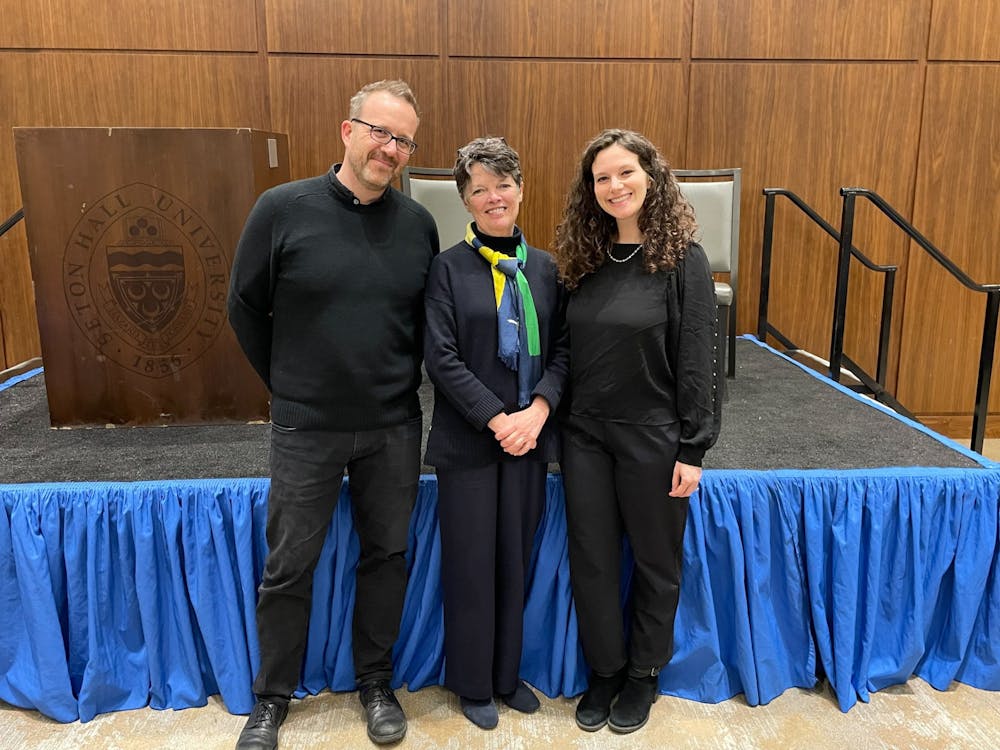Alice McDermott, a contemporary fiction writer, visited Seton Hall on April 1 as part of Poetry-in-the-Round, a university event that brings globally recognized writers to discuss their recent work with the Seton Hall community.
McDermott showcased her newest book, “Absolution.” The book was recognized as a New York Times bestseller and winner of the 2024 Mark Twain American Voice in Literature Award.
Throughout the entirety of McDermott’s career, she has been a finalist for a Pulitzer Prize, National Books Circle Award, and Kirkus Prize.
David Gomez, a freshman diplomacy and international relations major, said he did not know who McDermott was but liked these kinds of events.
“I went to the event because I do like poetry, and I like hearing authors speak,” Gomez said. “It just feels interesting to get an inside perspective onto what they write and why they write.”
Throughout the event, McDermott covered various topics, from reading a passage from “Absolution” to a Q&A with Dr. Nathan Oates, an English professor and the organizer of the event.
Given that “Absolution” is a book grounded in the recollection of stories from the Vietnam War period, McDermott discussed the importance of memory in her writing.
“Memory is always being rewritten,” McDermott said. “You remember something that happened yesterday, and then you remember something that happened six months ago in light of everything that happened in between, and suddenly that even becomes something else.”
For those in the audience who had not read her most recent book, she covered other topics pertaining to her life.
McDermott discussed her other profession: being a professor. She has since retired from teaching but emphasized its importance to her and her work.
“I taught for long enough and was a student myself for long enough that the notion of we’re all novices,” McDermott said. “We’re all trying to figure out how this art works. Even if you’ve done it before, you’ve written stories, you’ve published stories, you’ve published novels—every time you start a new story, you’ve never done this before. It’s a new story.”
A common topic throughout the Q&A was the duty of the author. McDermott expressed this in many ways.
She first emphasized the importance of the writer to create a world for the readers to visualize using the following quote from Joseph Conrad as a guide:
“‘One obligation of the fiction writer is to make you see,’” McDermott quoted. “‘Everything else will follow. Without it, nothing will follow.’”
However, she also expressed that authors must write in a way that makes reading their story worthwhile.
“Especially now, readers are so distracted. We’re all so distracted,” McDermott said. “Our attention spans are shrinking, we don’t trust anybody, everybody is out to tell us something and to convince us of something. So now more than ever, the fiction writer has to say, ‘This is just us. This is just my vision.’”
Emmely Suarez, a sophomore criminal justice major, said she thoroughly enjoyed the event.
“I’m a retired writer. I used to write a lot when I was younger,” Suarez said. “As years went by, I stopped, so this touched a place in my heart today.”
Another student in attendance, Thiago Alves, a sophomore marketing analytics major, related to the material McDermott talked about.
“I currently write for an independent magazine, so it was really interesting hearing from an expert that writes novels and really touches people’s hearts in very different ways,” Alves said. “It’s very hard to write fiction, so it’s really inspiring to see someone talk about it with such passion.”
Alves said he particularly enjoyed McDermott’s focus on humor to lighten the mood for the reader.
“We are all human, we go through hard times and through difficulties, but we always have to try to remember to smile at the end of the day, so when she talked about when she inserts humorous moments in her writing, it’s so true because sometimes we forget to pause and live those moments,” Alves said.
Gomez said he found the use of writing as an expression of empathy striking.
“When someone is writing a story, it is an exercise in empathy in a way because you have to put yourself in the perspective of someone who you might not necessarily agree with or be able to fully understand,” Gomez said.
Although not everyone in attendance was a writer or aspiring to be one, McDermott showed how a well-written novel can connect an audience.
“We say so little of substance to each other,” McDermott said. “The burden of the fiction writer is both to make every bit of dialogue significant when in reality, very little dialogue is of any significance.”
Kaelyn Blizard is a writer for The Setonian’s Campus Life section. She can be reached at kaelyn.blizard@student.shu.edu.





